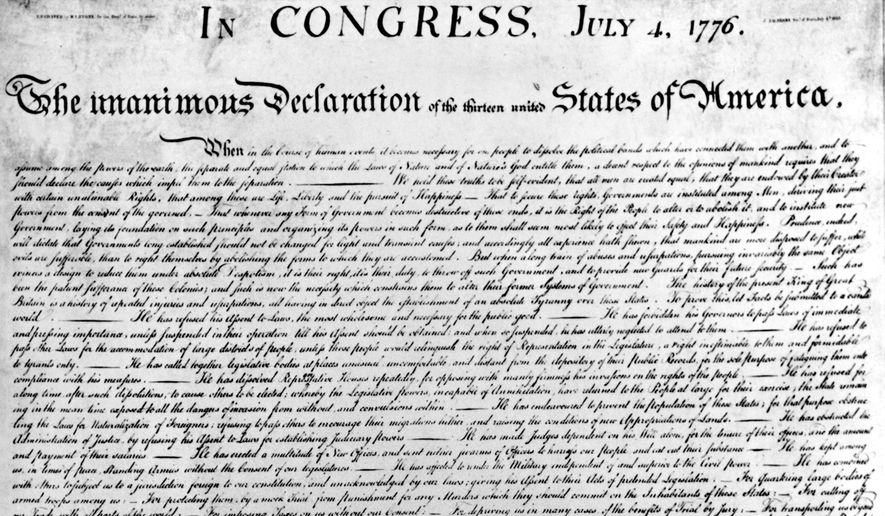In the week of America’s Independence Day, the algorithms of Facebook decided that the Declaration of Independence was hate speech.
The Liberty County Vindicator, a community newspaper between Houston and Beaumont, had been posting the whole declaration in small daily chunks for nine days on its Facebook page in the run-up to July 4. But the 10th excerpt was not posted Monday as scheduled, and the paper said it received an automated notice saying the post “goes against our standards on hate speech.”
Part of the standard notice, Vindicator managing editor Casey Stinnett wrote, included a warning that the newspaper could lose its Facebook account, on which it depends for much of its reach, if there were more violations.
The offending passage?
It was part of the document’s “Bill of Particulars” against Britain’s King George III: “He has excited domestic insurrections amongst us, and has endeavoured to bring on the inhabitants of our frontiers, the merciless Indian Savages, whose known rule of warfare, is an undistinguished destruction of all ages, sexes and conditions.”
Mr. Stinnett dryly replied in an article about the rejection, “Perhaps had Thomas Jefferson written it as ‘Native Americans at a challenging stage of cultural development’ that would have been better. Unfortunately, Jefferson, like most British colonists of his day, did not hold an entirely friendly view of Native Americans.”
SPECIAL COVERAGE: Best of 2020: Top stories and columns from The Washington Times
He noted that the newspaper wanted “a means of contacting Facebook for an explanation or a opportunity to appeal the post’s removal, but it does not appear the folks at Facebook want anyone contacting them. Or, at least, they do not make it easy.”
Within a day, Facebook had paid heed, allowing the posting and sending the Vindicator an apology.
“It looks like we made a mistake and removed something you posted on Facebook that didn’t go against our Community Standards. We want to apologize and let you know that we’ve restored your content and removed any blocks on your account related to this incorrect action,” Facebook wrote back, the Vindicator reported.
Reason magazine pointed out how Facebook’s actions were “silly” but also the inevitable logic of massive social-media sites trying to police millions of messages, a task that cannot be done by humans.
“They demonstrate a problem with automated enforcement of hate speech policies, which is that a robot trained to spot politically incorrect language isn’t smart enough to detect when that language is part of a historically significant document,” wrote Christian Britschgi, an assistant editor at the libertarian magazine.
Mr. Britschgi went on to note a perverse result of allowing the Vindicator’s first nine excerpts from the Declaration but not the tenth, exactly because of what he called “clearly racist” language.
The phrasing “serves as another example of the American Revolution’s mixed legacy; one that won crucial liberties for a certain segment of the population, while continuing to deny those same liberties to Native Americans and African slaves. But by allowing the less controversial parts of the declaration to be shared while deleting the reference to ‘Indian savages,’ Facebook succeeds only in whitewashing America’s founding just as we get ready to celebrate it,” he wrote.
• Victor Morton can be reached at vmorton@washingtontimes.com.




Please read our comment policy before commenting.